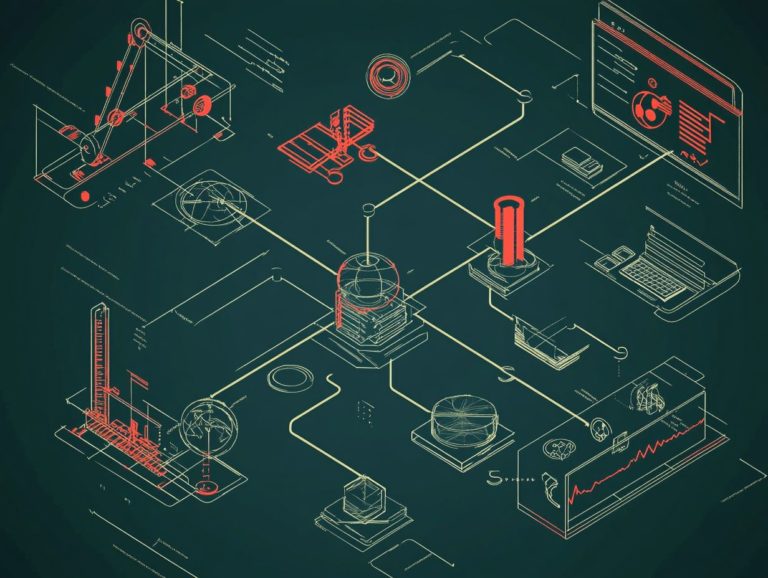Understanding the Role of Inventors in Patent Filings
In the realm of innovation, patents act as essential shields that protect your unique ideas and inventions.
At the heart of every successful patent is a key player: you, the inventor.
This article delves into the importance of patents and the multifaceted role you hold in the patent process.
From defining what it truly means to be an inventor to addressing the challenges you may encounter, we analyze how your contributions significantly influence the quality and success of patents.
Together, let s explore the dynamic relationship between inventors and their invaluable creations.
Contents
Key Takeaways:
- Patent filings are crucial for protecting inventions and hold significant value for inventors.
- An inventor is someone who creates a new and useful invention; their contributions are essential to the patent process.
- Inventors can work independently or collaboratively, and their involvement greatly impacts the quality and success of a patent.

The Importance of Patents
Understanding the importance of patents is vital for you as an inventor or business owner, especially within the framework of U.S. patent law. Securing patent rights can offer you significant competitive advantages, protecting your new inventions against unauthorized use.
A patent is more than just a legal document; it can also serve as a valuable financial asset. It allows you to license your inventions, attract investors, and protect your creations and ideas from public disclosure or infringement.
Navigating the patent application process is exciting and essential for your success, whether you are an independent creator or part of an organization, including foreign applicants seeking protection in the United States.
Why Patents are Valuable
Patents are invaluable assets that grant you exclusive rights to your inventions, safeguarding against unauthorized use while allowing you to commercialize your innovative ideas through licensing agreements.
By securing a patent, you not only protect your intellectual property but also unlock new opportunities for revenue generation. Through licensing agreements, you can permit other businesses to utilize your inventions in exchange for royalties, effectively transforming your idea into a consistent income stream.
This protective shield also acts as a deterrent to competitors who might otherwise seek to replicate your invention and profit from it without your consent. Holding a patent significantly elevates your market position, providing you with a competitive edge and establishing your credibility in your industry.
What is an Inventor?

An inventor is someone like you who dreams up a novel invention and can claim inventorship under U.S. patent law. This means you must be able to demonstrate both the conception of your invention and its unique contributions to your field.
The role of an inventor encompasses a wide range of qualities, from technical expertise to boundless creativity. It carries the responsibility of accurately representing your contributions in any patent application submitted to the United States Patent and Trademark Office (USPTO).
It’s essential for you to grasp the legal parameters of inventorship, as they directly influence your rights and obligations regarding patent ownership and protection.
Definition and Characteristics
An inventor is someone who creates or discovers a novel invention, playing a crucial role in its conception and development. In collaborative ventures, this person may even qualify as a joint inventor.
What truly distinguishes inventors is their unique combination of creativity, technical knowledge, and an understanding of the legal intricacies surrounding patent rights. A successful inventor has the remarkable ability to think outside the box, generating original ideas capable of revolutionizing industries or addressing urgent challenges.
Their technical expertise allows them to transform abstract concepts into tangible products, while their grasp of legal frameworks equips them to navigate the complexities of inventorship and safeguard their creations.
In situations involving joint inventors like the development of advanced medical devices each individual’s contribution can vary widely, leading to important questions about ownership and rights that necessitate careful legal consideration.
Take the first step today to protect your brilliant ideas!
The Role of Inventors in Patent Filings
Inventors play a crucial role in the patent filing process. You must provide accurate information about your contributions to the invention, ensuring correct inventorship is established in the patent application submitted to the U.S. Patent and Trademark Office (USPTO). Additionally, it’s important to consider understanding the role of prior art in patents during this process.
This careful approach isn’t just about legal compliance; it’s vital for protecting your patent rights and avoiding potential disputes that can arise from misrepresentation or errors in claiming inventorship. The clarity with which you express your role can significantly influence the success of your patent application.
Contributions to the Patent Process

Your contributions as an inventor to the patent process are fundamental. It’s not just about the innovation itself; it involves collaborating with patent attorneys to draft and file a careful patent application that accurately reflects your unique contributions.
You also actively engage in brainstorming and refining ideas that have the potential to become groundbreaking inventions. Working closely with legal experts helps you navigate the complex landscape of licensing agreements, ensuring your rights are protected while maximizing commercial opportunities.
This teamwork lets you express your vision clearly, boosting your chances of patent approval. With legal guidance, you can tackle challenges and negotiate terms that benefit everyone involved, paving the way for your innovations to thrive in the marketplace.
Types of Inventors
Inventors can generally be classified into two primary categories: independent inventors, who pursue their creations solo, and collaborative inventors, who thrive within teams or organizations. Collaborative inventors expertly navigate the complexities of U.S. patent law to safeguard their innovations.
Independent vs. Collaborative Inventors
As an independent inventor, you have the freedom to bring your ideas to life without external interference. This autonomy can ignite your creativity and allow for swift decision-making. However, you may face challenges when securing funding and resources.
In contrast, collaborative inventors benefit from shared skills and diverse perspectives, leading to more refined innovations. Yet, working with others can complicate the patent process, especially if ownership rights aren’t clearly defined from the start.
Finding a balance between individual aspirations and collaborative goals is crucial for navigating the invention landscape effectively, allowing you to take advantage of both worlds.
The Impact of Inventors on Patents

The influence of inventors on patents is remarkable. Their creativity and expertise are key to shaping the quality and success of patent applications under U.S. patent law.
By leveraging their unique contributions, you ensure that innovation is recognized and expertly protected.
Influence on Patent Quality and Success
The impact of inventors on patent quality and success is significant. Your innovative ideas and careful preparation in the patent application process can increase approval rates and open doors to better licensing opportunities.
This dedication is evident in the clarity of your patent documentation and the thoroughness of your research on existing technologies. By identifying prior art, you create a foundation for unique contributions and enhance the commercial viability of your inventions.
By collaborating with legal advisors and patent examiners, you ensure your submissions meet rigorous criteria, allowing your innovations to shine in competitive fields. This involvement builds a strong foundation for successful commercialization strategies, enabling your inventions to evolve into thriving businesses.
Challenges Faced by Inventors in Patent Filings
As an inventor, you face many challenges in the patent filing process. Navigating U.S. patent regulations can be overwhelming.
High filing fees and detailed documentation add to the difficulty. These hurdles can deter innovation and make the journey seem more daunting.
Obstacles and Solutions
Obstacles in the patent filing process include steep filing fees and confusion about inventorship. Partnering with a knowledgeable patent attorney can help reduce these hurdles.
You might feel overwhelmed by the complexities of intellectual property law, which protects your inventions and ideas. The many requirements can cause frustration and delays.
Financial assistance programs can help cover costs related to patent applications. Identifying reliable legal resources is key to navigating patent rights.
Collaborating with experienced patent attorneys can make your filing process faster and easier!





